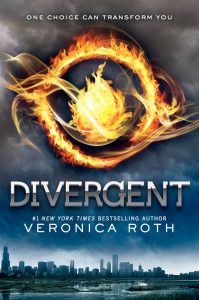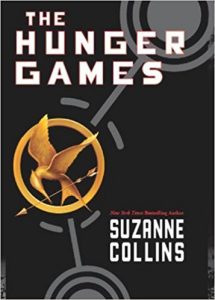When Fiction Gets Real: Dealing with the Death of Your Favorite Fictional Character
Camila Fagen Guitron // Blog Writer
Anthony Rodriguez, Emerson College student and avid reader, recalls sitting down with the last book in the Divergent trilogy when his favorite character—who will not be named for spoiler reasons—suddenly died. “It felt like a slap in the face,” he says.

It’s a common belief that fictional worlds shouldn’t affect us so much, yet for some people they are incredibly impactful. Coming to terms and dealing with these emotions can be frustrating and confusing, especially because some feel like they have no support from their loved ones. But those incomprehensible feelings do have an explanation, and there are things you can do to deal with them.
Why It Feels Like the End of the (Not so Fictional) World
A pivotal step for dealing with all sorts of emotions is understanding them first. However, understanding emotions that come from events that didn’t really happen may present some difficulty. “It makes absolute sense,” says Boston psychologist Dr. Anne Gehrenbeck-Shim. “It’s mainly two components. First, there is probably something we find compelling about the character. We identify with them, we follow them throughout everything,” she says. “When they die it’s like a grieving process. We’ve gotten to know them and we’ve invested emotional energy on them.”
There are scientific theories that explain this process. She refers to a psychological theory developed by Freud. The theory—cathexis and decathexis—is about when we’re building a relationship with someone. Cathexis, or the concentration of mental energy on one person, idea, or object is like a spider building a spider web, she explains. You have to invest a lot of time and energy into the relationship, like a spider does with its spiderweb. When that relationship is broken—decathexis, the withdrawal of cathexis—, in this case because of the characters’ death, you cannot simply break the spider web. You have to reabsorb it to build another one. Sometimes it’s even more personal than that. “Their deaths may bring up other losses in our lives,” she says, “like when we lost a close friend or a family member.”
Gehrenbeck-Shim says these characters may be our favorites for a reason. You spend hours—sometimes years, if we’re talking about a book series—reading about their adventures. You are with them through their ups and downs. You see them grow and form bonds with other characters. It is only reasonable to feel upset when you won’t have the chance to read about them anymore.
Find a Distraction

There are some common coping mechanisms that you can try if you find yourself upset. One of the most popular ones is to find something else to focus on. After reading something that was upsetting, the last thing you want to do is keep doing what is causing you distress. “Sit there and distract yourself and then go back to it,” says Emerson student Rodriguez. “When I was reading They Both Die at the End I kind of knew it was coming, so I took a break before it got too bad. I like to distance myself from the book to calm down before I dive in again. But only for a day or two, because if I spend more time away I know I won’t come back to it.”
So, take the time you need. In the meantime, watch your favorite movie, read your favorite pick-me-up book, do the thing you’ve been putting off. When you are ready, get back into that book.
Find Someone to Talk To
Finding a distraction can work wonders, but sometimes you’ll be lucky to have a friend who has also read the book and has experienced the same feelings. Some of your friends may even let themselves be coerced into reading said books. Or even if they haven’t, they will still let you dump all your feeling onto them. “It’s really the best thing you can do, find someone and talk to them,” psychologist Gehrenbeck-Shim suggests. “It’s very helpful to get your feelings out and see that you’re not the only one feeling them.”
Embrace Your Feelings
After you’ve talked about it, you can try to actively work to ease your emotions. The most effective way is by accepting them first, because hoping that they just go away is not an effective way to get rid of them. “I was very upset when I read The Hunger Games,” says Emerson film student and fiction enthusiast Emerlynn Shibayama. “I usually try to ignore it, but I don’t think it works. It doesn’t help when people tell me to get over it, either.”
Many people try to convince themselves that what they’re feeling is inconsequential or trivial. But the truth is that if it’s making you feel bad, then it’s not trivial at all. “Don’t beat yourself up about it, it’s natural to feel this way,” says Gehrenbeck-Shim. Don’t be ashamed of your feelings, it’ll be another added stress on top of already feeling upset about your favorite character’s death.
Lise Haines, author of Girl in the Arena, When We Disappear and writer-in-residence at Emerson College, says, “Embrace it. For me it’s better to take something away from the story, even if it hurts, than not taking anything.”

Don’t Force Yourself to Finish
Many people, like students Rodriguez and Writing, Literature, and Publishing major Gabriella Billiter, want to finish the story, even when it causes them pain. “Even though it may be tempting, I never stop reading when a character dies. Reading on usually gives me closure,” says Billiter. Having closure to the story may be helpful to many. But there are times when a character’s death can be particularly upsetting for one reason or another. “There was one time when it hit too close to home,” says Haines, “I felt like the best thing to do was to walk away from it.” In situations like this it’s important to know that you are under no obligation to continue reading, especially if it’s something that is taking a toll on your mental health. Distance yourself from the material if you feel like it’s the best thing for you and reach out for help if necessary.
Indulge in Fan-written Material
When the source material is too dire, some fans try other ways to obtain more information without hurting themselves. “I tend to go back and reread their scenes and major parts in the story,” says Billiter. “I rewrite in my head how the story could’ve gone so they could live.” It’s likely that other fans are also upset about a character’s death and have decided to take the issue into their own hands. They sometimes write stories about them and share them with the world. Popular sites where fans upload their material include Fanfiction.net, Archiveofourown.org and Tumblr. Sometimes they stick to the original plot, and sometimes fans take every liberty imaginable and create a whole new story about the characters you already know and love. Reading more material on your favorite characters, especially in absurd or happier scenarios, can be comforting.
The Author’s Side
It’s easy to blame authors for our emotions and to think that they spend their days planning how to make us suffer. After all, they’re the ones who killed our favorite characters. But these deaths can be hard on them too. “You just don’t think how to get rid of them,” says author and Emerson’s writer-in-residence Haines about how it feels to kill a character. “I was driving when I realized that a character was going to die in my story. It was surprising, I was elated,” she says. “It was unpleasant and scary, but it made absolute sense.”
Authors debate between doing what’s right for the story and what would make them and the readers happy. Many times, sacrificing one thing for the other. They get attached to the story and characters as much as readers do, if not more. “You get a similar feeling when you finish a book,” Haines says. “It’s like you killed them all off.”
Some Last Advice
Death in books is often necessary, and yes, it sucks. But try to remember that healing is a slow process and that it is different for everybody. Don’t try to rush it and don’t feel guilty or silly about it. Try different coping methods, whether the ones previously described or others like spoiling yourself to lessen the blow. Don’t let a bad experience discourage you from reading.

I concur with each element that you have called attention to. Much thanks to you for sharing your delightful considerations on this. This is fantastic data. Much thanks to you!